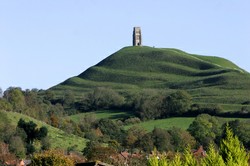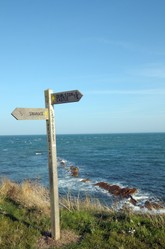Last Thursday night was a tense time, as the votes were counted.What was happening was that Scotland was deciding whether or not to quit the United Kingdom. I had contributed to the No campaign, having paid for some phone calls, so I obviously had a stake in the outcome, but the tension was running high. Would the kingdom survive as a united entity? At six am I arose and immediately went downstairs to check the results. The no campaign were ahead. Shortly afterwards the Fife result came through and the No campaign had won. Jubilation, but the work is just beginning as problems in the United Kingdom's political arrangements were highlighted and the ensuing discussion has been intense.

What now for the United Kingdom
by frankbeswick
The United Kingdom survived the independence referendum, but major constitutional questions are rising.
How the UK is Governed
The United Kingdom is a very centralized state, with the majority of power focused in London. Until the 1990s there was no layer of government between the central government and local councils, and the dominant political class were unwilling to devolve it. But tensions were arising. Scotland was unhappy, and there were tensions in Wales, while Northern Ireland was suffering endemic violence.Tony Blair managed to bring in devolved governments for Scotland and Wales. Northern Ireland had already a devolved government, but at the Good Friday agreement it was reformed as part of the peace process. Blair, however, was not really focused on Scottish devolution, as he was at heart a centralist who believed in big, authoritarian government to such an extent that at the end of his period of office many British people were talking about threats to liberty and an incipient police state developing. Fortunately, Blair is gone and the present government is no threat to liberty.
The problems began to become serious in Thatcher's time. Thatcher had a limited grasp of constitutional issues and was blind to the developing tensions. Her main strategy was the word No, asserted with an absolute conviction that the system would last as it is for ever and that taking a firm line with the lower orders was all that was needed. She allowed a head of pressure to build up in Britain, especially in Scotland.
Here is the problem. The U.K. electoral system is a national embarrassment. It works by first past the post, so the candidate with the most votes is elected, even if he has only a small percentage, below fifty per cent, a situation which can be achieved when there is a large number of candidates. This situation can produce anomalies. Under Thatcher the Conservatives enjoyed 60% of the seats with only at most 43% of the vote. The Conservative vote is mainly southern English. Scotland, which is mainly Labour voting, was governed by a party that it did not support. Yet when Labour was in power the situation was reversed, with Scots dominating England. Both parties were content to be running a defective electoral system because it was in their partisan advantage. Only the minority Liberal Democrats wanted a change to the voting system, but their power is limited.
Eventually, some devolution did occur, with Scotland and Wales getting their own state governments to add to the devolved government in Northern Ireland. England got nothing, and the government in Westminster [London] continued to exercise all power over England. This led to a situation where Scottish and Welsh members of parliament could vote on health and education in England, but not in their own countries, as these were matters for the devolved governments, but English members could exercise no similar authority in Scotland and Wales. Labour has been quite content with this, as the injustice to England means that they can use their Scottish votes in the Westminster parliament to control England. There were rumblings of discontent in the Conservatives, but no change to the historic injustice to England occurred.
England
 | Rick Steves’ England You can count on Rick Steves to tell you what you really need to know when traveling in England.In this guide, you’ll find a mix of splendid cities, ever-so-quaint villages, his... |
The Referendum
Let us be clear. Forty five per cent of Scots voted for independence, but fifty five per cent rejected it. The independence vote consisted of a minority of dedicated nationalists, but a large group of others who had different motives. Many had been convinced by an unjustifiable claim that the National Health Service in Scotland could only be kept safe by independence, though Scotland controls its own health service. Others were hoping for a socialist society, and some claimed that independence would enable them to create a just society. It is noteworthy that the referendum galvanised many voters from poorer classes to vote for independence, as many hoped that their deprivation might be ameliorated by becoming free of England.
National politicians offered Scots more devolved powers if they voted no. The no voters made much of the economic dangers of independence, which are quite real. There were genuine economic threats that might arise if independence happened.
Yes and No were distributed across the country, but the proportions varied according to area. The yes vote was strong in Glasgow and Dundee, but the strongest no vote was in Orkney. This is not surprising, as Orkney and Shetland only became part of Scotland in the fifteenth century, when Denmark ceded them as payment for a Queen's dowry. The people are more Norse than Scottish. The second and third strongest no votes were on the borders with England, which is not surprising, as the voters live next to the Auld Enemy and realize that the English are not the enemies that some nationalists think they are.[Never think that English hate Scots. We don't.] My son, who lived and worked in the Scottish borders in agriculture, pointed out that the farmers there need to criss-cross the borders all the time, so a new,harsher border made no sense to them. Remember also that cross border, English and Scottish marriages are common, so racial identity is not as strong there as it might be elsewhere.
Women voters were more skeptical about independence than males were, and it has been noted that men were more "Braveheart" about the prospect. Women were often quite wary of the prospect of economic dangers and social disruption. Yet there were men and women on both sides.
Many opponents of independence were driven by the idea of a family of nations sticking together, and I belong to this group. Identity plays a part in this. I am aware that I have a complex identity. I am English and British, but with Irish blood and a wee bit of Scots in me. I love living in the British Isles and feel strongly for the constituent nations. I have dwelt in Ireland and loved it, and who knows, I may yet finish up in Wales? But some people reject complex identity and are either English or Scots, etc.
Even in my family there were differences of opinion. Peter, my second son, will not call himself British, but insists that he is English, though he a very Irish looking man; Andrew, my eldest lived in Scotland for a time and insists on calling himself English and British, but he is aware of his kinship to Ireland [and is marrying a Portugese woman of Angolan ancestry.] Andrew is less Irish looking than Peter is. So even here in England sides have been taken in families, though there has been no acrimony; and this situation seems to prevail across Scotland.
Consequences.
There is relief in England that the family of nations has kept together, and most English do not begrudge the Scots their extra devolved powers. Yet the sleeping giant of English grievance is wakening. Many English are saying "It is fine that the Scots get stronger devolution, but what about us?" They [I can say we] want a constitutional change whereby English issues are decided only by English members of parliament. Some want an English parliament, as we are the only one of the four nations not to have our own. Others simply want a change where English issues are decided only by English members of parliament. This is simple fair play. We want equality, and so far we have been refused it.
Some Conservative politicians have jumped on the bandwagon and are demanding a resolution of the English issue. The Scots are not objecting. But the Labour leader is prevaricating, as he wants to wait until after the next general election, which Labour should win, where many suspect he wants to stall the issue out of existence. Why does Mr Milliband want to stall it out of existence? Easy, he will be relying on Scottish Labour votes to control Conservative voting England, as he is not likely to have a big enough majority from English constituencies. But many of his party members, including senior figures are convinced that change must happen; and the pressure from England is rising. The Welsh too are saying that they want the same powers that Scotland has.
There is also the problem of the Barnett formula, which allocates money across the regions of Britain. Scots receive more per head than the English do, as they have to deal with widespread rural communities,which are more expensive to run than towns are, and a population with an age profile higher than England's. David Cameron promised the Scots that this formula would continue, but some right wing Conservative politicians are rebelling. One, Owen Patterson, recently sacked as environment secretary, is demanding that the prime minister, Cameron, break his promise to the Scots. The response to this is that a promise made must be kept, but others are attacking the fact that Scotland gets more per head than England does.
The issue will fade out, as the powers promised to Scotland include the right to levy much of its own tax, so there will be less coming to Scotland from the rest of the UK than before. But in the meantime politicians with an agenda, some of whom are Right wing Conservatives out to unseat their leader, are making the most of the situation. They are doing this because they object that Mr Cameron established a coalition with the Liberal Democrats, whose influence has been to neutralize the Conservative right, denying them the opportunity to turn the UK into a land fit for exploiters to live in.
The prime minister and other party leaders have promised to expedite the change before the general election next May, but the Conservative right might stall for time, knowing that any bill still in passage when a general election is called becomes null. But the party leaders are keen to get the new powers for Scotland bill through before May. This may necessitate using a device known as a guillotine [metaphorical] where debates are kept short to ensure that emergency measures are quickly passed. The Right want English powers included in the same bill as increased Scottish powers, but Labour wants a longer process for a national conversation [for reasons not entirely honourable.] The right knows this and sees the opportunity for stirring up dissension and possibly blocking the increase in powers offered to Scotland.
Just to increase the pressure, certain Cornish nationalists, whose county, Cornwall, the most south westerly in the island, was recently acknowledged as the fifth nation, are demanding their own assembly.
It all sounds fun, doesn't it.
Britain
 | Lonely Planet Wales (Travel Guide) Lonely Planet: The world's leading travel guide publisher Lonely Planet Wales is your passport to all the most relevant and up-to-date advice on what to see, what to skip, and w... |
 | A History of Wales Stretching from the Ice Ages to the present day, this masterful account traces the political, social and cultural history of the land that has come to be called Wales. Spanning ... |
Reflection
Democracy won in Scotland, because there was a massive electoral turnout, one of the largest in British electoral history. The United Kingdom won. We managed to resolve a troublesome issue that in some countries would have caused bloodshed in a peaceful way. We showed that most of us prefer the ballot to the bullet.
The four nations have come out well. Scotland debated intelligently, and there seems to have been little acrimony from the other nations. There is little resentment to Scots, and most of the discussion is how to share powers with the other nations. The Irish nationalists, who have no cause to love Britain, maintained a dignified silence and refrained from exploiting the tensions for their own interest.
After the referendum the country will change, but it has focused thoughts and discussion on issues that have been simmering for years. There is a constitutional journey ahead of us. The road will be rocky, but on the strength of this experience it will be peaceful.
You might also like
After the Election: what now for the United Kingdom?The United Kingdom is facing a challenging few years in which its existence a...
Countdown to Crisis: the looming electoral problems in the Uni...In the coming general election due in May no party is likely to have a majori...





 TheThousand Year Gardenon 11/26/2025
TheThousand Year Gardenon 11/26/2025
 Women of the Gospelson 10/11/2025
Women of the Gospelson 10/11/2025
 Religious Gardenson 08/25/2025
Religious Gardenson 08/25/2025
 Doctor of the Church: John Henry Newmanon 08/03/2025
Doctor of the Church: John Henry Newmanon 08/03/2025



Comments
I do not know for sure. Edward is the least significant of the queen's children and his chance of inheriting the throne is minimal. So he might as well be treated as an aristocrat.
Thank you for your comment below in answer to my previous observation and question.
English Wikipedia intrigues me in their introducing hereditary peer Prince Edward into an article on life peerage.
Is Prince Edward unique because he is an hereditary peer with a life peerage or because he is a life peer ranked as a duke instead of a baron?
No.prince's Andrew and William do notbsitbinntheblords.
Thank you for your comment below in answer to my previous observation and question.
English Wikipedia indicates, in its article on Life peer, that "With the exception of the Dukedom of Edinburgh awarded for life to Prince Edward in 2023, all life peerages conferred since 2009 have been created under the Life Peerages Act 1958 with the rank of baron and entitle their holders to sit and vote in the House of Lords, presuming they meet qualifications such as age and citizenship."
Is Prince Edward an exception in not sitting and voting in the House of Lords, in numbering among hereditary peers (additionally obtaining life peerage) and/or in receiving a duke-ly not a baronial rank?
They once overlapped greatly until 1908 when under threat of a constitutional crisis and massive unrest the Lord's was forced to cede priority to,the commons. Since then its composition has been altered by the commons introducing life peerages.
They once overlapped greatly until 1908 when under threat of a constitutional crisis and massive unrest the Lord's was forced to cede priority to,the commons. Since then its composition has been altered by the commons introducing life peerages.
Thank you for your comment below in answer to my previous observation and question.
So richness associates with Conservative-ness (and vice versa?).
Does that mean that the Conservatives and the House of Lords overlap in their interests?
The south is richer than other areas, and as the Conservatives rule in the interests of the rich the rich tend to vote for them.
The third paragraph to the first subheading, How the UK is governed, alerts us that "The Conservative vote is mainly southern English."
Why is the Conservative appeal biogeographically centered southward?
I have it on very good authority that Boris is very "hands off" in his mayorship of London. I'm not sure whether that is a good or a bad thing, taking everything else into consideration. But I agree with you Frank, about his broken promises to London voters.